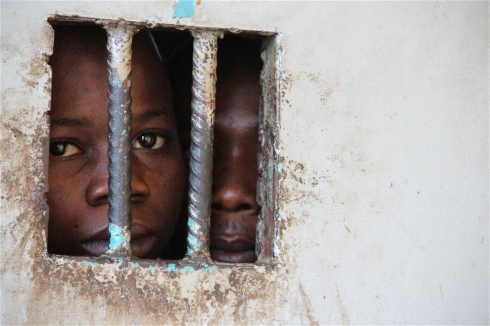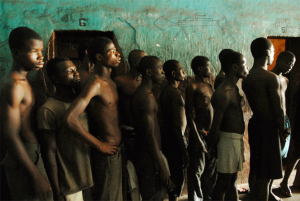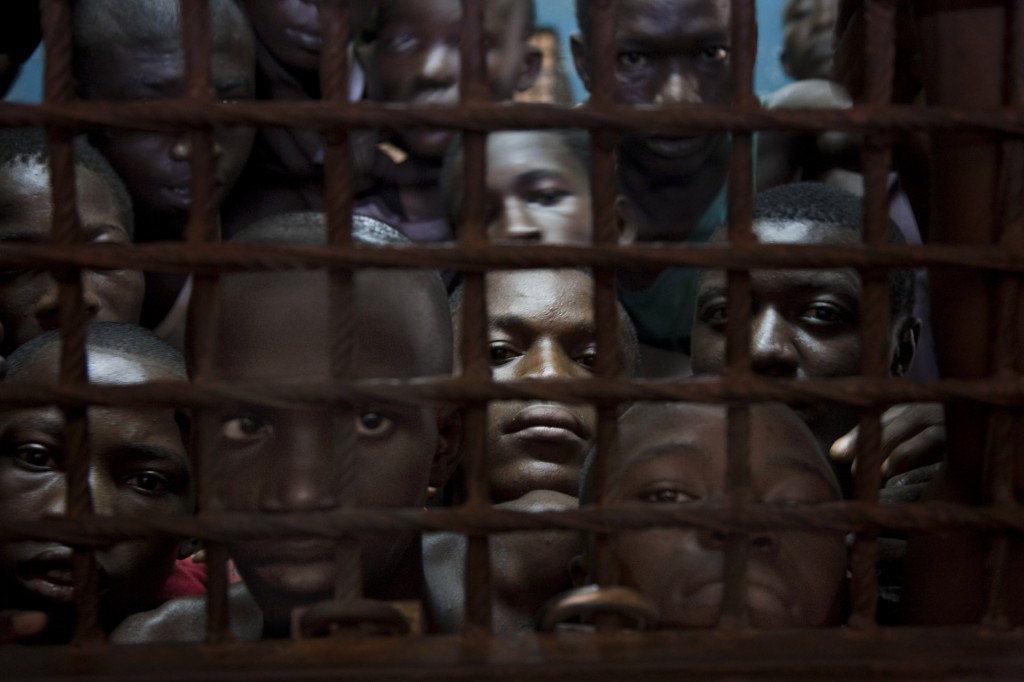IRIN
Dakar, 1 December 2014
It is next to impossible to avoid physical contact in an overcrowded prison. In Sierra Leone, heavily congested jails and a worsening Ebola outbreak make a potentially lethal combination. So how do you keep inmates safe?
Some of the safeguards against the virus are: A 21-day quarantine for fresh detainees before joining the old timers; training prison health workers and inmate leaders on Ebola prevention; and providing health and safety education and equipment.
 Such measures, and others, have so far helped keep the virus out of Sierra Leone’s 17 prisons and three juvenile offenders’ homes, said Mambu Feika, head of NGO Prison Watch Sierra Leone (PWSL), which is spearheading a three-month programme to prevent Ebola transmission in prisons.
Such measures, and others, have so far helped keep the virus out of Sierra Leone’s 17 prisons and three juvenile offenders’ homes, said Mambu Feika, head of NGO Prison Watch Sierra Leone (PWSL), which is spearheading a three-month programme to prevent Ebola transmission in prisons.
“There is no place where contact is more possible than in the prisons,” Feika told IRIN.
Sierra Leone has around 3,000 inmates. Most of its prisons are badly overcrowded. The main prison in the capital Freetown, for instance, was meant for 324 prisoners, but currently houses 1,919.
 PWSL is also aiming to get 500 inmates released to help ease congestion. Since launching the prison safety programme in September, it has helped secure the release of 50 detainees on bail. Another 100 have been freed for lack of evidence, and it has also obtained fines rather than custodial sentences for others.
PWSL is also aiming to get 500 inmates released to help ease congestion. Since launching the prison safety programme in September, it has helped secure the release of 50 detainees on bail. Another 100 have been freed for lack of evidence, and it has also obtained fines rather than custodial sentences for others.
GROWING EBOLA CASES
Sierra Leone is seeing a rise in cases, whereas in neighbouring Guinea the outbreak is stabilizing and in Liberia it is slowing down, according to World Health Organization updates on 26 November. In the week of 17-23 November, Sierra Leone reported 385 new confirmed cases. Guinea had 148 and Liberia 67 over the same period.
Information Minister Alpha Kanu told reporters on 26 November that some risky cultural practices were responsible for the current Ebola trends in Sierra Leone, but said the outbreak was at its peak and a downward trend would soon start.
While no Ebola case has thus far been reported among Sierra Leonean prisoners, in the eastern town of Kailahun, the wife of a prison officer and his son contracted the virus. “One serious concern is the prison officers. They are in constant interaction with community members,” said Feika. The virus first erupted in Sierra Leone in the eastern towns of Kailahun and Kenema earlier this year.
Almost 1,400 people have so far died of Ebola in Sierra Leone. Feika said prison authorities and the police have been helpful in identifying inmates who need legal representation in a bid to help decongest jailhouses and avoid the risk of infection in detention centres.
OVERSTRETCHED JUSTICE SYSTEM
Sierra Leone’s backlog of court cases, overwhelmed magistrates and judges, and slow court processes are blamed for the prison congestion. But there have been improvements lately in managing court records, said Ibrahim Tommy, director of the Centre for Accountability and Rule of Law, a Sierra Leonean advocacy group.
 Not all the blame rests with the judiciary though. “All offences that carry capital punishment are tried by jury. Unfortunately, it is so difficult to get 100 percent attendance by jurors, either because there is no ‘motivation’ for participating or because they don’t get punished for not participating,” Tommy explained.
Not all the blame rests with the judiciary though. “All offences that carry capital punishment are tried by jury. Unfortunately, it is so difficult to get 100 percent attendance by jurors, either because there is no ‘motivation’ for participating or because they don’t get punished for not participating,” Tommy explained.
Labyrinthine court procedures that result in lengthy pre-trial detention – some suspects have been detained for 10 years pending trial – and frequent adjournments are undermining confidence in the justice system, and to some extent in the government.
“Many do not believe that the government is doing enough to ensure a credible, fair and accessible justice system,” Tommy told IRIN. “There is a growing public perception of corruption in the judiciary, particularly with respect to bail. These issues need to be addressed without delay.”
Sierra Leone has made efforts over the past decade to improve the justice system and received external financial support. It has set up some institutions to help promote accountability and employed more magistrates.
“In spite of this, serious challenges persist. The police, prisons and the courts need a lot of support. Of the three institutions, the police gets the highest funding, which has not necessarily translated into public confidence in their responsiveness to security issues,” Tommy said.
IRIN
The humanitarian news and analysis service
of the UN Office for the coordination of Humanitarian Affairs.
The opinion expressed do not necessarily reflect those
of the United Nations or its Member States

